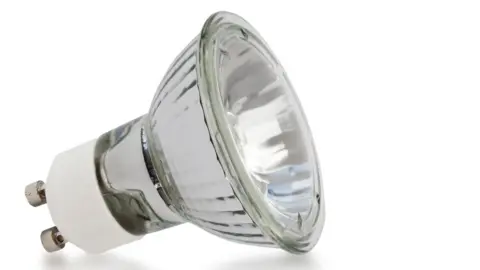Halogen lightbulb sales to be banned in UK under climate change plans
 Getty Images
Getty ImagesSales of halogen lightbulbs are to be banned in the UK from September, with fluorescent lights to follow, under government climate change plans.
The move will cut 1.26 million tonnes of carbon emissions a year and deliver consumers savings, officials say.
The UK began phasing out the sale of higher-energy halogen lightbulbs in 2018 under EU-wide rules.
Now retailers will no longer be able to sell most remaining halogen bulbs, such as kitchen spotlights.
Legislation for the plans is being brought forward this month by the government.
The plan will help continue the shift to low-energy LED lightbulbs, which account for about two-thirds of lights now sold in Britain.
It is expected to mean LEDs will account for 85% of all bulbs sold by 2030, officials said.
LED lights last five times longer than traditional halogen bulbs and produce the same amount of light, but use up to 80% less power.
'Less waste'
To help people to choose the most efficient lightbulbs, changes to the energy labels that consumers see on bulb packaging are being brought in, with the A+, A++ and A+++ ratings abandoned and efficiency graded between A-G, with only the most efficient bulbs given an A rating.
LED bulbs could be incorporated into the fluorescent light fittings as a more energy-efficient alternative, officials said.
Legislation will also include moves to phase out high-energy fluorescent lightbulbs - such as strip lights commonly found in offices - with a view to bringing an end to their sale from September 2023.


There was a time when the humble light bulb became the centre of a political storm over "green madness".
The EU had announced a ban on old-fashioned incandescent bulbs - the ones that give off more heat than light and use a lot of electricity in the process.
It was a move that led to a campaign of resistance with one newspaper even giving away the bulbs to encourage their use.
But this latest move - the final step in ending sales of halogen lights - comes in very different times.
Many types of halogen bulbs were already banned several years ago, so this is a tightening of the screw on energy waste rather than a massive upheaval.
But it does provide another signal that if the UK is to meet its promises to tackle the heating of the climate, every sector of the economy - in fact almost every aspect of our lives - will have to see some kind of change.

The cut in carbon emissions as a result of the new rules is the equivalent of removing more than half a million cars from the UK's roads, the Department for Business, Energy and Industrial strategy said.
It is part of a package of measures which it says will save consumers money and includes the right to get goods repaired, new energy labels and higher efficiency standards for white goods, TVs and other appliances.
Energy minister Anne-Marie Trevelyan said: "We're phasing out old inefficient halogen bulbs for good, so we can move more quickly to longer-lasting LED bulbs, meaning less waste and a brighter and cleaner future for the UK.
"By helping ensure electrical appliances use less energy but perform just as well, we're saving households money on their bills and helping tackle climate change."
Stephen Rouatt, chief executive of Signify UK, which owns Philips lighting, said: "Using energy-efficient LED equivalents for halogen and fluorescent lighting on an even broader scale will significantly help the UK on its journey to decarbonisation, as well as lowering the annual electricity bills for consumers."
